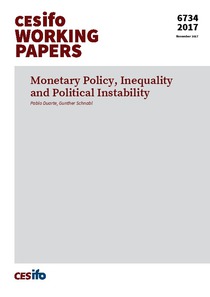Monetary policy, inequality and political instability
"Based on the concepts of justice by Hayek, Rawls and Buchanan we argue that the growing political dissatisfaction in industrialized countries is rooted in the asymmetric pattern in monetary policies since the 1980s for two reasons. First, the structurally declining interest rates and the uncon...
| Main Authors: | , |
|---|---|
| Institution: | ETUI-European Trade Union Institute |
| Format: | TEXT |
| Language: | English |
| Published: |
Munich
2017
CESifo |
| Subjects: | |
| Online Access: | https://www.labourline.org/KENTIKA-19396697124911148799-Monetary-policy,-inequality-an.htm |
| Summary: | "Based on the concepts of justice by Hayek, Rawls and Buchanan we argue that the growing political dissatisfaction in industrialized countries is rooted in the asymmetric pattern in monetary policies since the 1980s for two reasons. First, the structurally declining interest rates and the unconventional monetary policy measures have granted privileges to specific groups. Second, the increasingly expansionary monetary policies have negative growth effects, which reduce the scope for compensation of the ones excluded from the privileges. The result is the fading acceptance of the economic order and growing political instability." |
|---|---|
| Physical Description: | 37 p. Digital |

